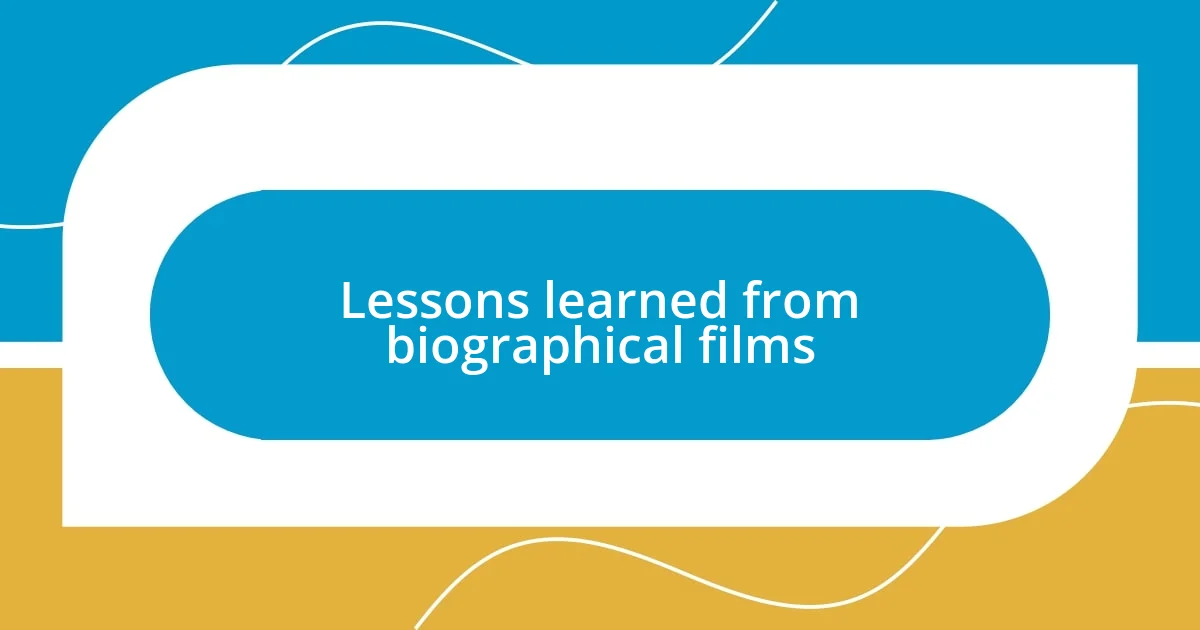Key takeaways:
- Biopics effectively create emotional connections by showcasing relatable struggles and human experiences, making viewers reflect on their own lives.
- Authenticity and accurate storytelling are crucial, as they create a deeper understanding of the subject’s experiences and the lessons they impart.
- Character development, shaped by relationships and challenges, highlights personal growth and inspires viewers to navigate their own life journeys.

What is a biopic
A biopic, short for biographical picture, is a film that dramatizes the life of a real person, showcasing their journey, struggles, and triumphs. I remember watching “The Theory of Everything,” and the way it brought Stephen Hawking’s story to life really struck a chord with me. It made me think, how often do we overlook the human experiences behind great achievements?
These films often highlight pivotal moments in a person’s life, giving us a glimpse into their emotions and motivations. I’ve found that when done well, biopics can evoke powerful emotions and spark inspiration. Have you ever felt a surge of motivation after watching one? It’s as if their challenges become a mirror to our own struggles.
While some biopics take creative liberties for dramatic effect, they often aim to capture the essence of their subjects, allowing audiences to connect on a deeply personal level. I’m always curious about how filmmakers balance accuracy with storytelling. Each biopic invites us to explore the complexities of a life lived, and in doing so, they offer reflections on our own lives and choices.

Key elements of compelling biopics
Compelling biopics share a few key elements that elevate them from mere recounts of a person’s life to profound explorations of their essence. One crucial element is emotional authenticity. I recall being deeply moved by “A Beautiful Mind,” as it portrayed the complexities of mental illness through John Nash’s lens. This authenticity allowed me to empathize with his struggles, making it not just a story of success but also one of vulnerability.
Another important aspect is the portrayal of transformative relationships. These connections often reveal how others influence the subject’s journey. For instance, in “Hidden Figures,” I was particularly struck by the bond between the three mathematicians and their supportive friendships. It reminded me of my own experiences with friends who uplifted me during challenging times, emphasizing that no one achieves greatness in isolation.
Finally, a well-paced narrative that balances triumph and tragedy keeps viewers engaged. Biopics that weave together the highs and lows of life tend to resonate deeply. I’ve found films like “Walk the Line,” which juxtaposes Johnny Cash’s brilliant moments with his personal demons, create a captivating arc. They transform the individual’s journey into a universal story we can all relate to.
| Key Elements | Description |
|---|---|
| Emotional Authenticity | Capturing genuine feelings and struggles that allow audiences to empathize. |
| Transformative Relationships | Highlighting influential connections that shape the subject’s life. |
| Paced Narrative | A mix of highs and lows that keeps viewers engaged throughout the film. |

Emotional connection with the audience
There’s something truly special about how biopics forge an emotional connection with the audience. These films often peel back the layers of a person’s life, revealing raw emotions and shared human experiences. I remember being particularly moved by “Erin Brockovich.” The fierce determination and vulnerability portrayed by Julia Roberts made me reflect on moments in my own life where I felt faced with insurmountable odds. It’s in these instances that I genuinely connect with the characters, recognizing my own struggles and motivations.
- Relatable Struggles: Biopics often depict challenges that resonate with viewers, making them feel less alone in their own battles.
- Humanized Stories: The ability to see iconic figures as flawed, relatable individuals creates a deeper bond between the audience and the subject.
- Emotional Resonance: Moments of joy, sorrow, and triumph crystallize not just the subject’s journey, but remind us of our own life milestones.
- Inspiring Narratives: Watching how characters overcome adversity can ignite a spark within us, encouraging us to tackle our own challenges with renewed vigor.
Through these emotional connections, biopics transcend entertainment; they become mirrors reflecting our personal narratives, revealing that beneath the surface, we’re all navigating the complexities of life together.

Authenticity in storytelling
Authenticity in storytelling is paramount in biopics. When I reflect on films like “The Pursuit of Happyness,” I realize it’s the raw portrayals of hardship that resonate so deeply. Seeing Chris Gardner’s journey through homelessness and struggle reminds me of my own life challenges, evoking a sense of connection that feels both powerful and real.
What truly captivates me is the way these stories often present the unvarnished truth of a person’s experiences. In “Selma,” I was struck by how the film didn’t shy away from the violence and adversity faced during the civil rights movement. This genuine representation struck a chord with me; it highlighted the importance of honesty in storytelling. It prompts me to ask: Isn’t it this authenticity that compels us to better understand not just the subject, but our own history?
Moreover, the nuances in a character’s flaws and triumphs often reflect our complexities. Take “The Imitation Game,” for example; Alan Turing’s struggles with societal acceptance alongside his brilliance make his story feel relatable. I ponder what it means to be different in a world that often rewards conformity, and I find myself appreciating the layers of humanity that each biopic unveils. This depth makes the narratives feel personal, allowing us to engage with them on a profound level.

Character development in biopics
Character development is the heart of any compelling biopic. I often find myself drawn to how these films present complex characters that evolve throughout their journeys. For instance, in “Walk the Line,” I remember being particularly fascinated by Johnny Cash’s transformation from a troubled artist to an iconic musician. The layers revealed in his character—not just his struggles with addiction but also his quest for redemption—made me think about how we all have paths to traverse, often marked by setbacks and growth.
Another aspect that captivates me is the relationships that shape these individuals. In “A Beautiful Mind,” the portrayal of John Nash’s relationship with his wife adds depth to his character. It prompts me to consider how love and support can influence our journeys. Watching their bond grow amid turmoil made me reflect on the people in my own life who have helped me navigate challenges. This connection is vital because it illustrates that character development is not a solitary endeavor; it’s deeply intertwined with our interactions.
Moreover, the challenges faced pave the way for transformation. When I think about “The Theory of Everything,” seeing Stephen Hawking’s battle with ALS not only highlights his intellectual brilliance but also emphasizes his resilience and determination. It serves as a powerful reminder that character development often stems from overcoming adversity. I can’t help but wonder: How do the struggles we face shape our identities? In my experience, it’s through grappling with life’s obstacles that I often discover my true self, much like the characters brought to life on screen.

Impact of historical accuracy
The impact of historical accuracy in biopics truly shapes the viewer’s experience and understanding of the subject’s life. When I watched “Lincoln,” I found myself reflecting on the meticulous attention to detail, which brought President Lincoln’s struggles and moral dilemmas to life. It sparked conversations with friends about how much of our interpretation of history relies on powerful narratives, making accuracy not just important, but essential.
Conversely, biopics that take liberties with historical facts can often lead to misunderstandings. I remember catching a glimpse of “The Greatest Showman” and feeling torn; while the music was captivating, the narrative took significant artistic license. It made me rethink how much we trust cinematic portrayals of history. The blend of fact and fiction can skew our understanding, raising a question: Are we, as viewers, responsible for seeking the truth behind the entertainment? In my own journey, I’ve often discovered that diving deeper into subjects portrayed in film enriches my appreciation and perspective.
In my experience, the emotional weight of historical accuracy cannot be understated. Watching “12 Years a Slave” left me profoundly moved, as the film’s commitment to authenticity made the brutality of that time period palpable. It’s moments like these that linger in my mind, evoking feelings of empathy and understanding. This emotional connection fosters a greater appreciation for both the people whose lives are depicted and the lessons their stories impart. Isn’t it fascinating how the truth can resonate so deeply and inspire change in our own lives?

Lessons learned from biographical films
Biographical films teach us invaluable lessons about resilience and the human spirit. Watching “Erin Brockovich,” I felt an inspiring surge of determination as Erin fought against overwhelming odds. Her tenacity pushed me to ask myself: When have I stood up for what I believe in, against all challenges? It reminded me that even our personal battles, no matter how small, can lead to significant change.
Another lesson I often reflect upon is the importance of authenticity. In “Rocketman,” the raw portrayal of Elton John’s struggles with identity and acceptance resonated deeply with me. It made me think about the times I’ve struggled to express my true self and how essential it is to embrace our uniqueness. Isn’t it amazing how these films can act as mirrors, reflecting our own experiences and prompting us to explore our identities more fully?
Furthermore, the relationships depicted in these films often highlight the transformative power of connection. In “The Pursuit of Happyness,” the bond between Chris Gardner and his son left me teary-eyed. Their journey made me reflect on the unconditional support I’ve received from my loved ones during tough times. It reminds me that while our individual journeys are important, it’s often the people we have beside us that help us navigate life’s hurdles.














